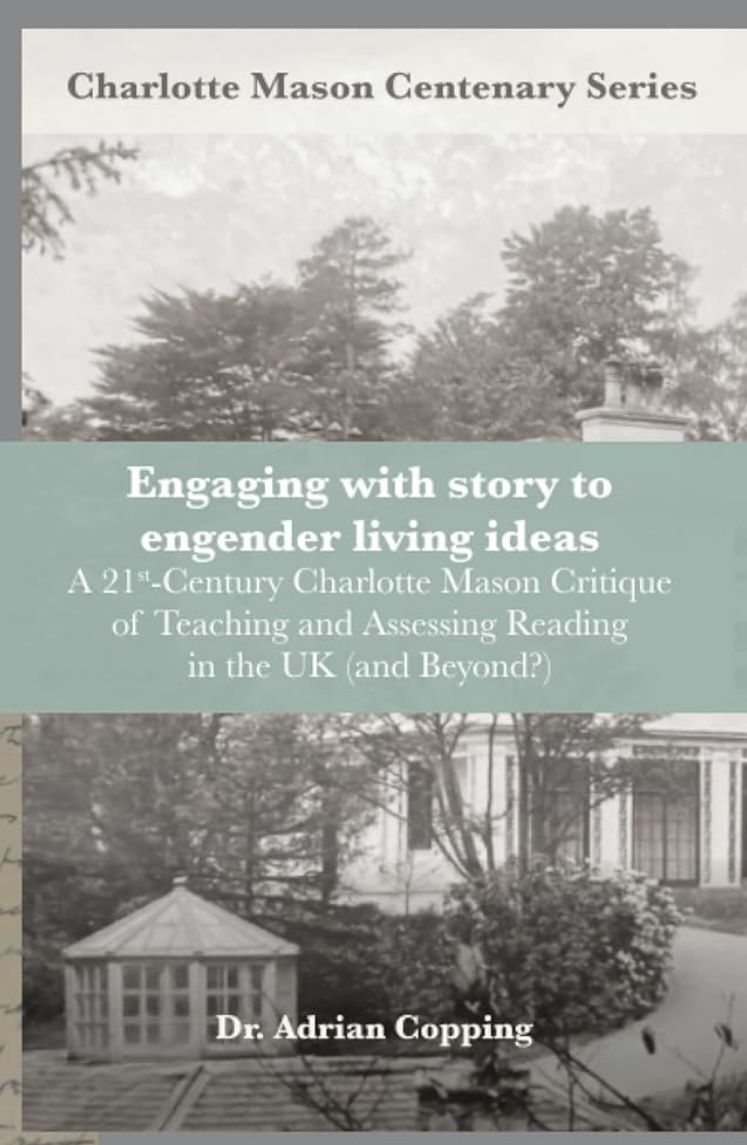February 19, 2024
Engaging with Story to Engender Living Ideas with Dr. Adrian Copping

Introduction
The Charlotte Mason Centenary Series, a multi-authored monograph series commissioned in connection with the Charlotte Mason Centenary, is designed to highlight and explore the continuing educational and leadership relevance of the late 19th-century British educationalist Charlotte Mason (1842-1923) through the collective contributions of The Armitt Museum and Library, the University of Cumbria, the Charlotte Mason Institute, and other scholars and practitioners worldwide.
This post is included in a series on the monographs. Each post gives a snapshot of the author's motivation for writing, the various topics and content of each monograph, and suggestions for who might benefit most from the work.
Interview
Adrian Copping is the author of the monograph titled Engaging with Story to Engender Living Ideas: A 21st-Century Charlotte Mason Critique of Teaching and Assessing Reading in the UK (and Beyond?). Adrian is Senior Lecturer in English & Literacy and Primary PGCE Programme Leader at University of Cumbria. Following his undergraduate degree and teacher education at St Martin's College, Lancaster, Adrian taught in two contrasting primary schools in Lancashire before returning as a teacher educator. Adrian's particular interests are around creativity and creative thinking, and particularly how this influences children's writing. He is the author of 'Being Creative in Primary English' published by Sage Education and has recently achieved his doctorate in creative thinking and writing. Adrian continues to develop close working relationships with a variety of primary schools, often utilising his teacher-in-role and English expertise to support learning and curriculum development.

What motivated you to join this research project?
Dr. Adrian Copping: Having studied at St Martin's College, Lancaster, many years ago now and being very aware of Charlotte Mason and her contribution to education, I was very keen to find out more. I was also, selfishly I suppose, looking for a writing project post PhD that would be interesting and also link to other work I have been doing. I was aware but not really in much depth about Charlotte Mason's notion of books as living ideas and the almost awe that story and narrative held for her. The read was to open up new worlds, new ideas, new perspectives, an experience to savour.
Why did you pick your topic?
Adrian: I have been a senior lecturer in English/literacy for many years now and I have been engaged in the business of teaching children and supporting them to read for over 27 years. I am a passionate reader myself, and I think Charlotte Mason has much to say to policymakers today about reading and a reading-for-pleasure pedagogy. Much of my teaching career in the primary classroom has had to focus on preparing children for decontextualized reading texts to put a score on a spreadsheet and go towards the school's league table position. Reading should be life-giving.
What was the most interesting thing you discovered during your research and writing?
Adrian: How much Charlotte Mason was what famous Yorkshire author and Her Majesty's Inspector Gervase Phinn would call a successful deviant. Charlotte Mason stood against those trying to force her to choose specific books, and stood against an establishment forcing a traditional curriculum into children's minds.
What one or two ideas do you most hope people take away from reading your monograph?
Adrian: A pedagogy of reading for pleasure is needed in our schools today. Teachers should have much more understanding of books as living ideas, not just as models for children to write from.
Who do you think should (especially) read your monograph?
Adrian: This monograph is ideal for policymakers, teachers and teacher educators.

FROM THE TEXT
"Throughout history, from the time of the great Roman teacher Seneca to the time of Jesus Christ and on through the centuries to the invention of print, story has been used to enable people to engage with concepts and ideas." (p. 9)
"Children, Mason says through the pen of Cholmondley, need books, good books, well-written books." (p. 16)
"If the purpose for education is as Mason would have it, to develop character, then the focus changes and requires the reader to engage with the deeper ideas in the text, to think about the dilemmas facing characters and learn to feel what they feel, and to enjoy the power of the story." (p. 22)
"For Mason, the written word provided opportunities for learners to explore, experience, and enjoy the world around them and imagine other worlds and places not seen." (p. 3)

Adrian's monograph is available in print as a physical or digital copy.

